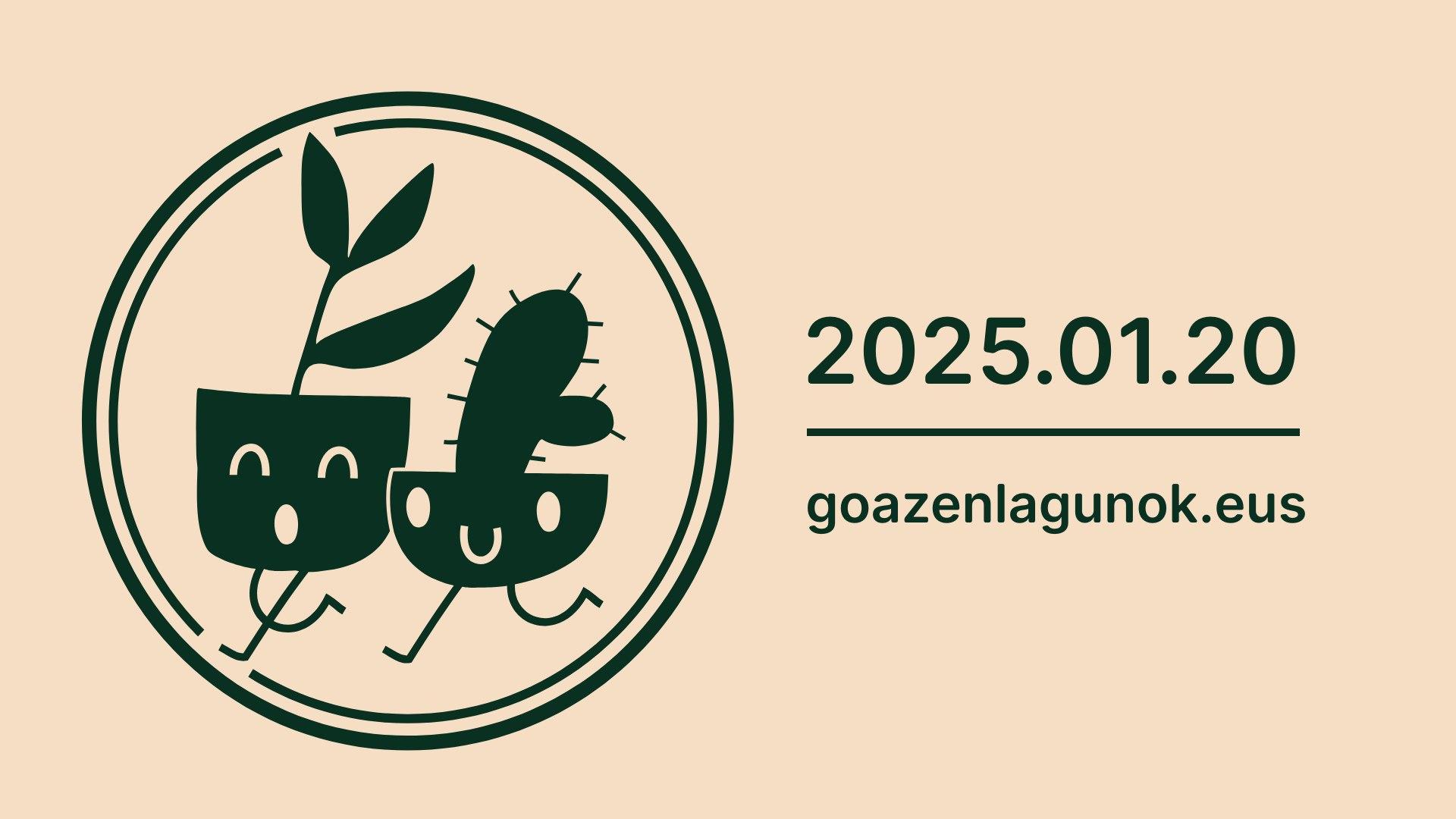"In social networks, instead of reflecting, we have to position ourselves continuously"
- Lucía Lijtmaer answers the questions with calm and humor. He did so during the presentation of the book Ofenditos, at the San Telmo Museum of Donostia-San Sebastian, and he did so the following day at the bar Los Riojanos de Egia. He believes that the strength of social movements has provoked a reactionary response to the crisis of violence.

Bartzelonan hazi zen eta Madrilen bizi da. Idazlea eta kultur kritikaria. Lau liburu argitaratu ditu: Quiero los secretos del Pentágono y los quiero ahora (Capitán Swing, 2015) Casi nada que ponerte (Libros del Lince, 2016), Yo también soy una chica lista (Destino, 2017) eta Los ofendiditos (Anagrama, 2019). Horrez gainera, Público TVen Deforme Semanal programa aurkezten du Isa Calderónekin batera, eta azken bost urteetan Princesas y Darthvaders umore jaialdia antolatu du Madrilgo La Casa Encendida gunean.
Offenses: He has come to Donostia to present his book on the criminalization of protest. How did the desire to write about the subject come about?
Silvia Sesé, editor of Anagram, approached me and asked if I wanted to write about any topic. In the New Notebooks Anagram collection, I published the booklet, and that format allowed me to write a short piece about a topical issue. I was interested in doing something like this, not around something that's in the air, but in thinking about the things that are happening. At first, the main axis was puritanism. I've always been very interested in how the history of the United States of America, beginning in the 17th century, formed the concept of nation there, and that's very attached to the Puritans, so I started with it. Then, however, I opened up the perspective, and in the end I have also raised other issues, such as the issue of pain and the situation of the media in Spain.
And how did you open up the prospect?
I read many opinion postulates and opinion articles and saw how many of the attitudes and opinion tendencies of the ultra-conservative areas of the EE.UU. were being implemented in Spain without any screening, and how they were also being introduced into areas that were considered more progressive or at least central, which are not considered reactionary. All of a sudden I noticed that the lexicon joined the two strands.
In fact, in the book you have analyzed the genealogy of three concepts: what is easily offended (offenses), neopuritanism and political justice. When did they emerge, in what context?
The term political equity emerged in the 1990s through an article in the press. A journalist moved to Berkeley University, where he studied, and realized that the environment had changed since his time, and that students were working on issues that had previously been out of college, such as ecology, recycling, rationalization, etc. The journalist explained all of this in an article and called it PC. Political correctness. As a result, eleven articles were published linking political correctness to censorship. All these authors were related to neoliberal foundations; in the book Dark Money, this process [Dark money, Jane Mayer] is perfectly described, how an entire ideological system emerged, an entire system of thought, to fight the intellectual left. Political justice is one of the concepts used for this purpose. Neopuritanism also began to be used in the 1980s, against sectors of the feminist movement, against second and third waves, and today both concepts have been adopted without any kind of reflection in Spain.
And that story of what's easily offended?
That also comes from the United States. It's a muzzle of the term Snowflake. It emerged in the 1990s, but now it is Trump who has made his own. The origin of this concept is that there is a generation that believes that all people are special and unique, like snowflakes. Today, Trump uses it for everything, for the Democrats, for the Left, and really, to criticize all those who are against it.
How does it easily hurt?
I based myself on a sketch of the Pantomima Full group, which perfectly reflects the clichés that excel on this figure: only protest on the net, never on the street, complains about everything that offends, and because it has no humor, it offends with everything. On the other hand, it's related to new masculinities, but it's a pose, not because I've really reflected on their gender privileges.
"I find it terrible when a roommate puts a tweet, the things they tell her. All this is a sign of a very sick and terribly misogynist society.”
He says that concepts originating from the United States have spread widely in the pillars of opinion in Spain, why now?
I'll give you my opinion. I think M-15 is a reaction against the movement and the new social movements, and it has developed in opinion before reaching politics. It's also a reaction to feminisms. There is a message like: “Yes, all of these things are fine, but we don’t happen.” In my opinion, the objective of this type of reaction is to maintain a space of privilege, which has materialized between 2017 and 2018, precisely because during those years women have gone out into the street in mass and quite dramatically, and feminist movements have started to organize in network, overcoming the structures of the movements themselves, which has generated a response.
Let us now turn to puritanism. This concept is mainly associated with sexual behavior, but the original Puritans were not so closed in this respect, right?
Yeah, when I found out about it, I was astonished and so I put it in the book. In the wake of the Puritans, a certain acute sexual morality has come to our time, but in reality, in the new colonies of Puritans, which have later become New Hampshire or Connecticut, the pleasure associated with sex was highly valued. Of course, some criteria had to be kept – fidelity, lack of sex until marriage, etc. – but the same sex was not as related to guilt as in the Catholic religion. For example, in the writings on good life in the Puritan colonies, it is pointed out that spouses must have frequent sexual intercourse as a condition to lead a good life.

Today, this concept of strict puritan is being used against feminists, right?
Yes, it is used against a feminism that is considered censor and that aims to regulate the private life of others. Today, in the press and in the media, a group of writers has clung to this concept and they call several feminists puritan. These thinkers suggest that there is a large mass of women who seem to apply the morality of the public and the private. That is not the case, of course, but I believe that this image has been created with forcefulness, which is taken out in all debates and seems indestructible. A kind of general warning has been created about the existence of a feminist puritanism. It seems to me to be totally interested and unrealistic.
What can be done to oppose this image?
We need response spaces, of course, and we need to inform people. It's a very complicated whirlpool, and I think social media has a lot to do with it. On social media, it does nothing but introduce content, fill out forms about yourself. Every day we express what we think of each thing. Instead of thinking, you have to position yourself continuously, and that's not very interesting. There is no room for more solid arguments or reasoning. I, as far as possible, try to avoid them, because I don't think they do any good to anyone.
Across the conjectures, there's data. The book summarizes the research conducted by Pikara Magazine and attorney Laia Serra, which analyzes the insults and harassment received by journalists working in the public sphere. You have a public party, how did you experience it?
We've all had problems. I haven't had a lot of problems, I don't know why exactly, but I would say that there's a big difference between appearing on television or not. I don't show up on television, so I haven't experienced that kind of harassment. I have had problems at certain times, when it comes to certain specific articles, and it is very unpleasant. Every time I talk about feminism in interviews, they leave me five hundred comments, but I don't read them, I defend myself, because I have no interest in hurting myself. Many of my friends have suffered this persecution, and it is impossible that this does not provoke psychologically. I believe it is the responsibility of society that women do not have to suffer. If it happened to men who write in the media or speak in public, they couldn't believe it. It seems terrible to me, when a colleague tweet, they tell him things: they show them the photos of the pistols, they tell them about their children… All this is a sign of a very sick and terribly misogynistic society, which should shame people.

However, it is strange that women keep writing.
Yeah, really. I insist, I think that influences, and often, before writing or saying anything, if you know that what you are going to say will generate answer or debate, psychological issues come to light: anxiety, fear… I think it is very daring how colleagues put their body and face each day.
We will change the subject. This is the fourth book, and I was struck by the fact that you have developed very different subjects.
The books are different, yes, but they have a similar thing: the voice. In a way, everyone is written in the first person. The first, the essay on the secrets of the Pentagon -- I want the secrets of the Pentagon and now I want them -- (I want the secrets of the Pentagon and now) -- for example, is a short chronicle about Deep Web. The media talk about everything that has to do with the Internet – everything is surfing, net… – in a very fetish way, and there are some cases of online activism that I am particularly interested in. This is what I mainly dealt with in the book.
The second, Almost nothing to wear (almost nothing to wear) is more related to your story, right?
I worked that book for a long time. On the one hand, it is the story of two Argentine men who dedicated themselves to the world of fashion: The story begins in the 1960s and ends in the Corralito era. I met them, and the story was very interesting to me. I could work on the subject in the form of a third person, but then I realized that, as I knew them, you couldn't work from the outside, and also that story has to do with the emigration of my parents.
Parents are exiled.
Yes, I was born in Argentina, but six months after birth we went to Barcelona, fleeing the military dictatorship. I am very interested in the question of exile and migration, what it means to live and grow in another country, what oral accounts are created, what happens to the family itself, what family you grow up with, how you make friends…
After publishing I am also a ready girl (I am also a clear girl), it is directly a book that deals with feminism.
Yes, it is a pop essay, made from humor, on the one hand to bring feminism closer and on the other to analyze how all that is reflected in pop culture, which interests me a lot. I wanted to explore cheerleads, influencers... As my friend Marc Giró says, I would like the Instagram influencers to be there in twenty years’ time, and see what has happened to them, how they have changed – or not. It's an interesting topic, what about those languages and positions.
Lighten?
It seems that only serious things are important. Outside the book, for example, the actors that are valued are always dramatic actors, dramatic art is really important, but there are big actors that do comedy and it seems like it's a secondary art. I think we have to break these classifications. The fact that the tone is not serious does not mean that the things that are said are not interesting. And with humor as well: it seems that if you say things with a sense of humor, you belittle the importance of what's been said, but often, humor is a weapon to be able to enter spaces that don't belong to it. It seems to me to be a very important tool, it should not be neglected.
“Azkenaldian nagusitu diren iritzi korronteetan, anekdota bat hartzen da, eta osotasun gisa eta gauza orokor moduan aurkezten. Aktibista beganoen bideoarekin [Almas veganas taldeak oilo-etxalde handietako tratu txarrak salatu dituzte] horixe gertatu dela iruditzen zait. Kasu guztiz anekdotikoa hartu dute, eta aitzakia gisa erabiliz, teoria edo mugimendu oso bat kritikatzen dute, informatu gabe edo informazio interesatua emanez, gainera. Eta hainbat gairekin egiten dute hori: feminismoarekin, bestelako identitateekin…”.
Aspaldi pertsona oso zatar bat ezagutu nuen, urrun izatea komeni den pertsona horietako bat. Bere genero bereko pertsonengana zuzentzeko, gizonezkoengana, “bro” hitza erabili ohi zuen. Edozein zapaltzeko prest zegoen, bere helburuak lortzeko. Garai hartatik hitz... [+]
Sare sozialetan badira zenbait pertsona eragin gaitasun handikoak. Jarraitzaile ugari dute, eta euren iritziak egiatzat hartzen dira. Askok, ordea, egia barik, interes propioa edo klase baten interesak iraunkortzea bilatzen dute. Ameriketan komentokrata deitzen zaie. Alegia,... [+]
Ortutik itzuli berritan erabaki nuen Twitterretik alde egitea, oraindik Twitter zenean. Auzolan batera joan nintzen, brokoliak eta azaloreak landatzera, eta mindfulness efektua zapuztu zidan algoritmoak, idazle feminista transgorrotatzaile baten txioak jaurtitzearekin... [+]
Ikerketa bat egin dute Alemanian, hauteskundeen atarian: kontuak sortu dituzte TikToken, X-n eta Instagramen, eta aztertu egin dute algoritmoak zer nolako edukiak erakusten dituen. Guztietan, algoritmoak eskuinera eta eskuin muturrera jotzen du gehien, TikToken nabarmen.
Azken boladan gero eta gehiago entzuten dugu gazte askok etxebizitza erosteko ahalmenik ez dugula. Batzuetan, badirudi ez dagoela beste gairik; egia da gai serioa dela. Niri neuri ere, 31 gertu izan arren, oraindik pixka bat falta zait neurea izango den etxebizitza lortzeko... [+]
In 2018, I leveraged social media and most communications from devices to try to control where I focus on life. Every day I go on that task, in the light of the moth, because my curiosity is constantly looking for fresh information to help me understand reality. At that time I... [+]






















